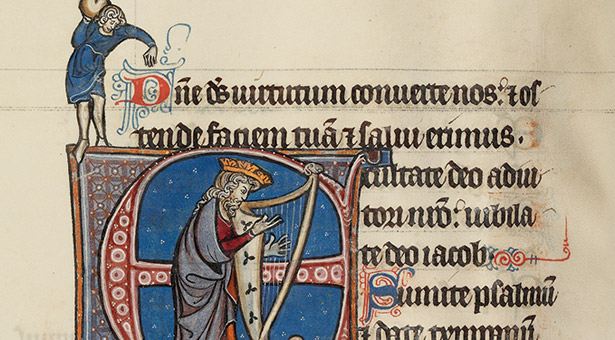The Bible & Theology Toward Christian Maturity
The Psalter as Scripture
The Psalms Are Not Individual Units, but a Beautiful Whole
By Frank Spina, Professor of Old Testament and Autumn Quarter Lectio Writer | Digital Image Courtesy of The Getty's Open Content Program

This image of King David playing the harp is from the Bute Psalter, a small prayer book containing all 150 psalms, probably made for a noblewoman in the late 1200s. (Bute Master, “Initial E: David Playing the Harp and a Man Heaving a Rock,” 6 11/16" x 4 11/16", 1270-–80, the J. Paul Getty Museum.)
The Psalms is arguably among the most favored of biblical books. This is hardly surprising given the passionate spirituality, radical honesty, soaring praise, agonizing lament, poetic beauty, and intense personal struggle exhibited by these compelling poems. Even those who are not necessarily religious find Psalms attractive in light of the human emotion and perception reflected in them, not to mention the majesty of their literary expression.
Still, while the Psalms may be viewed as a product of literary genius or spiritual sensitivity, for Christians (and Jews) they are first and foremost Scripture. What does reading them as such require?
One answer to that question is suggested by the very structure of the Psalter. Indeed, using the word “Psalter” — which refers to all 150 canonical Psalms — is itself telling. The Psalms do not come to us as a series of individual units. Instead, each is part of a larger whole: a Psalter. Granted, the Psalms are highly personal, but are not individualistic. Thus, each psalm is to be read in light of the other psalms as well as in the light of the rest of the biblical canon.
In recent years, scholars have paid attention to the structure of the Psalms and the difference this makes in interpretation. For instance, the Psalter is divided into five segments, each of which concludes with a benediction or blessing: 1–41; 42–72; 73–89; 90–96; 107–150.
Psalm titles are also instructive. Curiously, Psalm 3 is the first titled psalm. However, this is intentional. Since Psalms 1 and 2 are untitled, they in effect serve as titles, thereby introducing and facilitating a proper reading of the Psalter.
Psalm 1 characterizes people who live according to or go against the Lord’s Torah. One way promotes life, the other destruction (1:3–5). But what is this Torah? Usually translated “law” or “instruction,” Torah refers to the first five books of the Bible (Genesis through Deuteronomy, or the Pentateuch), the commandments and rules that indicate how to respond to God’s love and grace (Exodus 19 through Numbers 10:10; Deuteronomy), and the story that accents God’s elect people and their role in God’s reconciling plan. Though the Psalms are human words about God, reading them as Torah transforms them into God’s word for God’s people. Serving as a title, Psalm 1 admonishes us to read the Psalter as Torah.
Psalm 2, on the other hand, encourages us to read the Psalter messianically. In this psalm, the world’s rulers are depicted as conspiring against God and God’s anointed, or messiah (2:1–3). But such conventional power is no match for God or God’s royal son (2:4–9). If the world’s power brokers had any sense, they would realize this. Ultimately, all appearances to the contrary, divine power as expressed through God’s messiah will prevail. In essence, Psalm 2 tells us that God will have the final say. We are to read the Psalter with that confidence.
Given the import of Psalms 1 and 2, and the manner in which they serve as titles for the whole Psalter, it is altogether fitting that the Psalms end on a doxological note. Psalm 150 calls for praise, not only on the part of God’s peo¬ple but on the part of “everything that breathes” (150:6). In fact, Psalm 150 is the final doxological exclamation point for a number of concluding psalms, which give a resounding “Hallelujah” to the whole Psalter (see Psalms 146–149). Praise is the only possible response to a Psalter that begins with Psalms 1 and 2.
Listen to the podcast or subscribe to weekly guided Bible reading at spu.edu/lectio.
